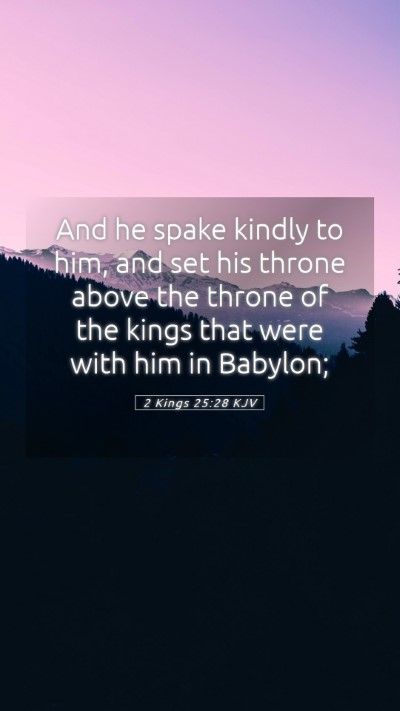Understanding 2 Kings 25:28
Bible Verse: 2 Kings 25:28
"And he spake kindly to him." (2 Kings 25:28)
Verse Meaning and Interpretations
The verse speaks of the kindness shown by Evil-merodach, the king of Babylon, toward Jehoiachin, king of Judah. After a prolonged period of imprisonment, Jehoiachin is released and treated with grace. This moment highlights themes of mercy, restoration, and the unfolding of God's providential plan in history.
Commentary Insights
-
Matthew Henry:
Henry emphasizes the significance of mercy in leadership. Evil-merodach's action of "speaking kindly" indicates a shift from cruelty to compassion, which is critical in the context of political power dynamics and the sovereignty of God over nations.
-
Albert Barnes:
Barnes points to the historical implications of this event. He notes how the release from bondage is a reflection of hope for the Jewish people, and the favorable treatment Jehoiachin receives signifies a new beginning for the nation.
-
Adam Clarke:
Clarke's commentary delves into the moral aspects of the verse. He sees Evil-merodach's approach as a lesson in humility and the importance of speaking with gentleness, which can foster reconciliation and healing relationships.
Historical Context
This verse occurs after the destruction of Jerusalem, a pivotal moment in Israel's history. Jehoiachin's imprisonment symbolizes the nation's downfall while his restoration by Evil-merodach serves as a turning point, echoing the cyclical nature of judgment and grace consistently seen throughout the Scriptures.
Theological Implications
- Mercy and Grace: Plays a critical role in the biblical narrative, emphasizing that even in times of despair, God's grace shines through unexpected channels.
- Restoration: The release of Jehoiachin symbolizes hope and the potential for renewal, a major theme in both Old and New Testaments.
- Divine Sovereignty: The transition from Babylonian cruelty to kindness illustrates God's control over the affairs of men and nations.
Application of the Verse
2 Kings 25:28 can be applied to daily life in various ways:
- Demonstrating Kindness: In a world often driven by power struggles, showing kindness can be revolutionary.
- Hope in Despair: Just as Jehoiachin found hope during a dark time, individuals can find confidence in the belief that circumstances can change for the better.
- Seeking Reconciliation: The importance of gentle words in restoring relationships offers a practical lesson in conflict management.
Related Bible Cross References
- Jeremiah 52:31 – Discusses the release of Jehoiachin and the view of Babylon's king towards him.
- 2 Samuel 9:7 – David’s kindness to Mephibosheth highlights a similar theme of mercy towards the descendants of enemies.
- Isaiah 61:1-3 – Proclaims the mission of bringing good news and comfort, resonating with the themes of restoration in 2 Kings 25:28.
Conclusion
The examination of 2 Kings 25:28 provides profound insights into God's nature, reminding believers of the importance of kindness and grace, historical narratives of redemption, and how the past can inform future hope. This verse invites individuals and study groups to delve deeper into its implications and applications, leading to a richer understanding of Scripture.


